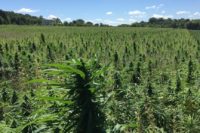On January 15, 2021, the USDA published its final rule on US hemp production. The rule, which becomes effective on March 22, 2021, expands and formalizes previous guidance related to waste disposal of noncompliant or “hot” crops (crops with a THC concentration above .3 percent). Importantly for the industry, the new disposal rules remove unduly burdensome DEA oversight and provides for remediation options.
Producers will not be required to use a DEA reverse distributor or law enforcement to dispose of noncompliant plants. Instead, producers will be able to use common on-farm practices for disposal. Some of these disposal options include, but are not limited to, plowing under non-compliant plants, composting into “green manure” for use on the same land, tilling, disking, burial or burning. By eliminating DEA involvement from this process, the USDA rules serve to streamline disposal options for producers of this agricultural commodity.
 Alternatively, the final rule permits “remediation” of noncompliant plants. Allowing producers to remove and destroy noncompliant flower material – while retaining stalk, stems, leaf material and seeds – is an important crop and cost-saving measure for producers, especially smaller producers. Remediation can also occur by shredding the entire plant to create “biomass” and then re-testing the biomass for compliance. Biomass that fails the retesting is noncompliant hemp and must be destroyed. The USDA has issued an additional guidance document on remediation. Importantly, this guidance advises that lots should be kept separate during the biomass creation process, remediated biomass must be stored and labeled apart from each other and from other compliant hemp lots and seeds removed from non-compliant hemp should not be used for propagative purposes.
Alternatively, the final rule permits “remediation” of noncompliant plants. Allowing producers to remove and destroy noncompliant flower material – while retaining stalk, stems, leaf material and seeds – is an important crop and cost-saving measure for producers, especially smaller producers. Remediation can also occur by shredding the entire plant to create “biomass” and then re-testing the biomass for compliance. Biomass that fails the retesting is noncompliant hemp and must be destroyed. The USDA has issued an additional guidance document on remediation. Importantly, this guidance advises that lots should be kept separate during the biomass creation process, remediated biomass must be stored and labeled apart from each other and from other compliant hemp lots and seeds removed from non-compliant hemp should not be used for propagative purposes.
The final rules have strict record keeping requirements, such rules ultimately protect producers and should be embraced. For example, producers must document the disposal of all noncompliant plants by completing the “USDA Hemp Plan Producer Disposal Form.” Producers must also maintain records on all remediated plants, including an original copy of the resample test results. Records must be kept for a minimum of three years. While USDA has not yet conducted any random audits, the department may conduct random audits of licensees.
Although this federal guidance brings some clarity to hemp producers, there still remains litigation risks associated with waste disposal. There are unknown environmental impacts from the industry and there is potential tort liability or compliance issues with federal and state regulations. For example, as mentioned above, although burning and composting disposal options for noncompliant plants, the final rule does not address the potential risk for nuisance complaints from smoke or odor associated with these methods.
 At the federal level, there could be compliance issues with the Resource Conservation and Recovery Act (RCRA), Comprehensive Environmental Response Compensation and Liability Act (CERCLA) and ancillary regulations like Occupation Safety and Health Administration (OSHA). In addition to government enforcement under RCRA and CERCLA, these hazardous waste laws also permit private party suits. Although plant material from cultivation is not considered hazardous, process liquids from extraction or distillation (ethanol, acetone, etc.) are hazardous. Under RCRA, an individual can bring an “imminent and substantial endangerment” citizen suit against anyone generating or storing hazardous waste in a way the presents imminent and substantial endangerment to health or the environment. Under CERCLA, private parties who incur costs for removal or remediation may sue to recover costs from other responsible parties.
At the federal level, there could be compliance issues with the Resource Conservation and Recovery Act (RCRA), Comprehensive Environmental Response Compensation and Liability Act (CERCLA) and ancillary regulations like Occupation Safety and Health Administration (OSHA). In addition to government enforcement under RCRA and CERCLA, these hazardous waste laws also permit private party suits. Although plant material from cultivation is not considered hazardous, process liquids from extraction or distillation (ethanol, acetone, etc.) are hazardous. Under RCRA, an individual can bring an “imminent and substantial endangerment” citizen suit against anyone generating or storing hazardous waste in a way the presents imminent and substantial endangerment to health or the environment. Under CERCLA, private parties who incur costs for removal or remediation may sue to recover costs from other responsible parties.
At the state level, there could be issues with state agency guidance and state laws. For example, California has multiple state agencies that oversee cannabis and hemp production and disposal. CA Prop 65 mandates warnings for products with certain chemicals, including pesticides, heavy metals and THC. The California Environmental Quality Act (CEQA) requires the evaluation of the environmental impact of runoff or pesticides prior to issuing a cultivation permit. Both environmental impact laws permit a form of private action.
Given the varied and evolving rules and regulation on hemp cultivation, it remains essential for hemp producers to seek guidance and the help of professionals when entering this highly regulated industry.



